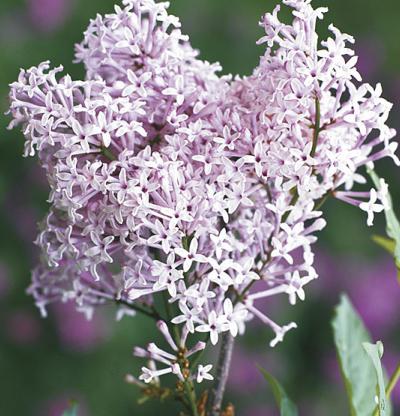





 Lilac (Syringa pubescens)
Genus:
Syringa
This species has an untraditional, spicy fragrance, and it is one of the most strongly scented lilacs. In midseason, it bears single, white-throated, pale purple flowers that open to white. It forms a shrub 10 feet high by 10 feet wide.
Noteworthy Characteristics:
Lilac flowers are beloved for bouquets, and when in bloom, hummingbirds and butterflies are drawn to them. Lilacs are generally a forgiving bunch, tolerant of roadside sites and neglect.
Care:
Grow in reasonably fertile, well-drained soil in full sun; prefers neutral to slightly alkaline soil. Promptly deadhead spent blossoms to produce more robust blooms for the following year. Prune lightly in late winter or early spring to maintain a healthy framework, remembering that most species form flowers the previous season. Plant in areas with good air circulation to thwart disease. Because lilacs are fire retardant, they can be considered for planting near homes that are susceptible to wildfires. Most lilacs require a period of chilling dormancy.
Propagation:
Sow seed in a cold frame when fresh or in the spring. Take softwood cuttings or layer in early summer. Graft in winter; bud in summer.
Problems:
Powdery mildew, dieback, leafroll virus, mycoplasma-like organisms (MLO), root knot nematode, Verticillium wilt, witches' broom, bacterial leaf spot, anthracnose, borers, scale, caterpillars.
Lilac (Syringa pubescens)
Genus:
Syringa
This species has an untraditional, spicy fragrance, and it is one of the most strongly scented lilacs. In midseason, it bears single, white-throated, pale purple flowers that open to white. It forms a shrub 10 feet high by 10 feet wide.
Noteworthy Characteristics:
Lilac flowers are beloved for bouquets, and when in bloom, hummingbirds and butterflies are drawn to them. Lilacs are generally a forgiving bunch, tolerant of roadside sites and neglect.
Care:
Grow in reasonably fertile, well-drained soil in full sun; prefers neutral to slightly alkaline soil. Promptly deadhead spent blossoms to produce more robust blooms for the following year. Prune lightly in late winter or early spring to maintain a healthy framework, remembering that most species form flowers the previous season. Plant in areas with good air circulation to thwart disease. Because lilacs are fire retardant, they can be considered for planting near homes that are susceptible to wildfires. Most lilacs require a period of chilling dormancy.
Propagation:
Sow seed in a cold frame when fresh or in the spring. Take softwood cuttings or layer in early summer. Graft in winter; bud in summer.
Problems:
Powdery mildew, dieback, leafroll virus, mycoplasma-like organisms (MLO), root knot nematode, Verticillium wilt, witches' broom, bacterial leaf spot, anthracnose, borers, scale, caterpillars.
Copyright © www.100flowers.win Botanic Garden All Rights Reserved